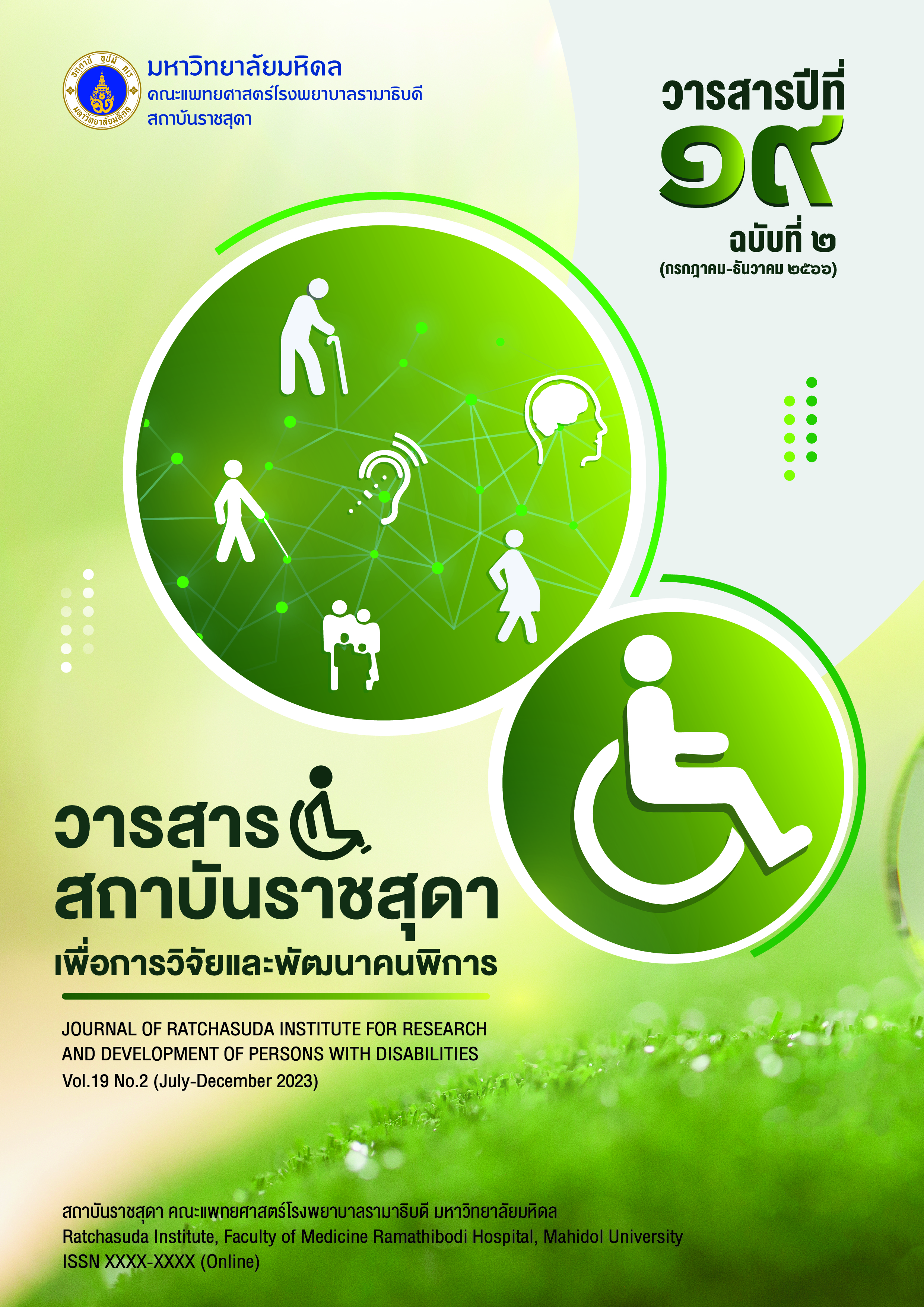ผลของกิจกรรมดนตรีบำบัดตามแนวคิดของคาร์ล ออร์ฟ ที่มีต่อการพัฒนาทักษะทางสังคมในผู้สูงอายุ
คำสำคัญ:
ผู้สูงอายุ, กิจกรรมดนตรีบำบัดตามแนวคิดของคาร์ล ออร์ฟ, ทักษะทางสังคมบทคัดย่อ
การวิจัยนี้มีวัตถุประสงค์เพื่อเปรียบเทียบระดับทักษะสังคมของผู้สูงอายุ ก่อน ระหว่าง และหลังการทำกิจกรรมดนตรีบำบัดตามแนวคิดของคาร์ล ออร์ฟ ใช้ระเบียบวิธีวิจัยกึ่งทดลองแบบกลุ่มเดียววัดซ้ำ กลุ่มตัวอย่างคือผู้สูงอายุ จากสถาบันผู้สูงอายุแมคเคน จังหวัดเชียงใหม่ จำนวน 10 คน เข้าร่วมกิจกรรมดนตรีบำบัดแบบกลุ่ม จำนวน 12 ครั้ง ครั้งละ 40-45 นาที เป็นระยะเวลา 6 สัปดาห์ กิจกรรมดนตรีบำบัดตามแนวคิดของคาร์ล ออร์ฟ ประกอบด้วย 5 กิจกรรม ได้แก่ 1) กิจกรรมทักทาย 2) กิจกรรมเข้าจังหวะ 3) กิจกรรมร้องเพลง 4) กิจกรรมเล่นเครื่องดนตรีเป็นกลุ่ม และ 5) กิจกรรมอำลา เครื่องมือที่ใช้ในการวิจัย ได้แก่ 1) แบบสอบถามข้อมูลกลุ่มตัวอย่าง 2) แบบประเมินการทำดนตรีบำบัดรายบุคคลด้านทักษะทางสังคม และ 3) แบบสังเกตการณ์ระหว่างกิจกรรม วิเคราะห์ข้อมูลโดยการวิเคราะห์ความแปรปรวนแบบวัดซ้ำเพื่อเปรียบเทียบค่าเฉลี่ยทักษะทางสังคมในผู้สูงอายุ ก่อน ระหว่าง และหลังการร่วมกิจกรรม และวิเคราะห์ข้อมูลจากการสังเกตโดยการวิเคราะห์เนื้อหา ผลการวิจัย พบว่า กิจกรรมดนตรีบำบัดตามแนวคิดของคาร์ล ออร์ฟ สามารถช่วยพัฒนาทักษะทางสังคมในผู้สูงอายุได้ จากการประเมินทักษะด้านสังคมรายด้านและโดยภาพรวม พบว่า ทักษะสังคมจำนวน 11 ด้าน จากทั้งหมด 12 ด้าน ที่มีค่าเฉลี่ยสูงขึ้นอย่างมีนัยสำคัญทางสถิติที่ระดับ .05 และค่าเฉลี่ยทักษะทางสังคมภาพรวมหลังจากการเข้าร่วมกิจกรรมดนตรีบำบัดมีระดับสูงขึ้น เมื่อเทียบกับก่อน และระหว่างการร่วมกิจกรรมดนตรีบำบัดอย่างมีนัยสำคัญทางสถิติที่ระดับ .05
Downloads
เอกสารอ้างอิง
American Orff-Schulwerk Association. (2021). More on Orff Schulwerk. https://aosa.org/about/more-on-orff-schulwerk/?fbclid=IwAR3lb5EZikXVgRAdVkp6lo3dYERNFUWnSUwTx6Aw-opoWQ75htkiM3uTlRI.
Darrow, A. A. (2008). Introduction to Approaches in Music Therapy (2nd ed.). American Music Therapy Association.
Davis, W. B., Gfeller, K. E., & Thaut, M. (2008). An introduction to music therapy: Theory and practice. American Music Therapy Association.
Department of Mental Health. (2015). Guidelines for psychological social care of the elderly to prevent health problems (4th edition). Division of Mental Health Promotion and Development.
Dezfoolian, L., Zarei, M., Ashayeri, H., & Looyeh, M.Y. (2013). A Pilot Study on the Effects of Orff-Based Therapeutic Music in Children with Autism Spectrum Disorder. Music and Medicine, 5, 162-168.
Ghasemtabar, S. N., Hosseini, M., Fayyaz, I., Arab, S., Naghashian, H., & Poudineh, Z. (2015). Music therapy: An effective approach in improving social skills of children with autism. Advanced biomedical research, 4, 157. https://doi.org/10.4103/2277-9175.161584
González-Ojea, M. J., Domínguez-Lloria, S., & Pino-Juste, M. (2022). Can music therapy improve the quality of life of institutionalized elderly people? Healthcare, 10(2), 310. https://doi.org/10.3390/healthcare10020310
Kayili, G., & Kuşcu, Ö. (2020). The effects of Orff-based attention-enhancing music education programme on impulsive preschool children’s cognitive tempo. Early Child Development and Care, 190(3), 390–399.
Mathew, D., Sundar, S., Subramaniam, E., & Parmar, P.N. (2017). Music therapy as group singing improves Geriatric Depression Scale score and loneliness in institutionalized geriatric adults with mild depression: A randomized controlled study. International Journal of Educational and Psychological Researches, 3(1), 6-10.
Mey, S. C. (2013). Music Therapy: An Approach Used To Train Children with Autism Spectrum Disorder. International Journal of Child Development and Mental Health, 1(1), 57–73. https://he01.tci-thaijo.org/index.php/cdmh/article/view/67056
Nawsuwan, K., & Suwanraj, M. (2019). Current Problems and Care Needs of Older Adults Living in Local Administrative Organization Responsibility Area in the Lower Southern of Thailand. Boromarajonani College of Nursing, Uttaradit Journal, 11(2), 118-132.
Panich, R. (2021). The Enhancing Aesthetics for building Self-esteem in Elderly People. Humanities and Social Sciences Review, 9(3), 28-39.
Pasiali, V., & Clark, C. (2018). Evaluation of a Music Therapy Social Skills Development Program for Youth with Limited Resources. Journal of music therapy, 55(3), 280–308. https://doi.org/10.1093/jmt/thy007
Ramey, M. (2011). Group music activities for adults with intellectual and developmental disabilities. Jessica Kingsley Publishers.
Schumacher, K. (2013). The importance of Orff Schulwerk for musical social-integrative pedagogy and music therapy. Approaches: Music Therapy & Special Music Education, Special Issue 5(2), 113-118.
Ueda, T., Suzukamo, Y., Sato, M., & Izumi, S. (2013). Effects of music therapy on behavioral and psychological symptoms of dementia: a systematic review and meta-analysis. Ageing research reviews, 12(2), 628–641.
Voigt, M. (2013). Orff Music Therapy: History, principles and further development. Approaches: Music Therapy & Special Music Education, Special Issue 5(2), 97-105.
Werner, J., Wosch, T., & Gold, C. (2017). Effectiveness of group music therapy versus recreational group singing for depressive symptoms of elderly nursing home residents: pragmatic trial. Aging & mental health, 21(2), 147–155.
Wheeler, B. L. (2015). Music Therapy Handbook. The Guilford Press.
World Federation of Music Therapy. (2011). What is music therapy. http://www.wfmt.info/WFMT/President_presents..._files/President%20presents...5-2011.pdf
Zanini, C. R. de O., & Leao, E. (2006). Therapeutic Choir - A Music Therapist Looks at the New Millenium Elderly. Voices: A World Forum for Music Therapy, 6(2). https://doi.org/10.15845/voices.v6i2.249
ดาวน์โหลด
เผยแพร่แล้ว
รูปแบบการอ้างอิง
ฉบับ
ประเภทบทความ
สัญญาอนุญาต
ลิขสิทธิ์ (c) 2023 วารสารสถาบันราชสุดาเพื่อการวิจัยและพัฒนาคนพิการ

อนุญาตภายใต้เงื่อนไข Creative Commons Attribution-NonCommercial-NoDerivatives 4.0 International License.
บทความที่ได้รับการตีพิมพ์เป็นลิขสิทธิ์ของวารสารสถาบันราชสุดาเพื่อการวิจัยและพัฒนาคนพิการ






